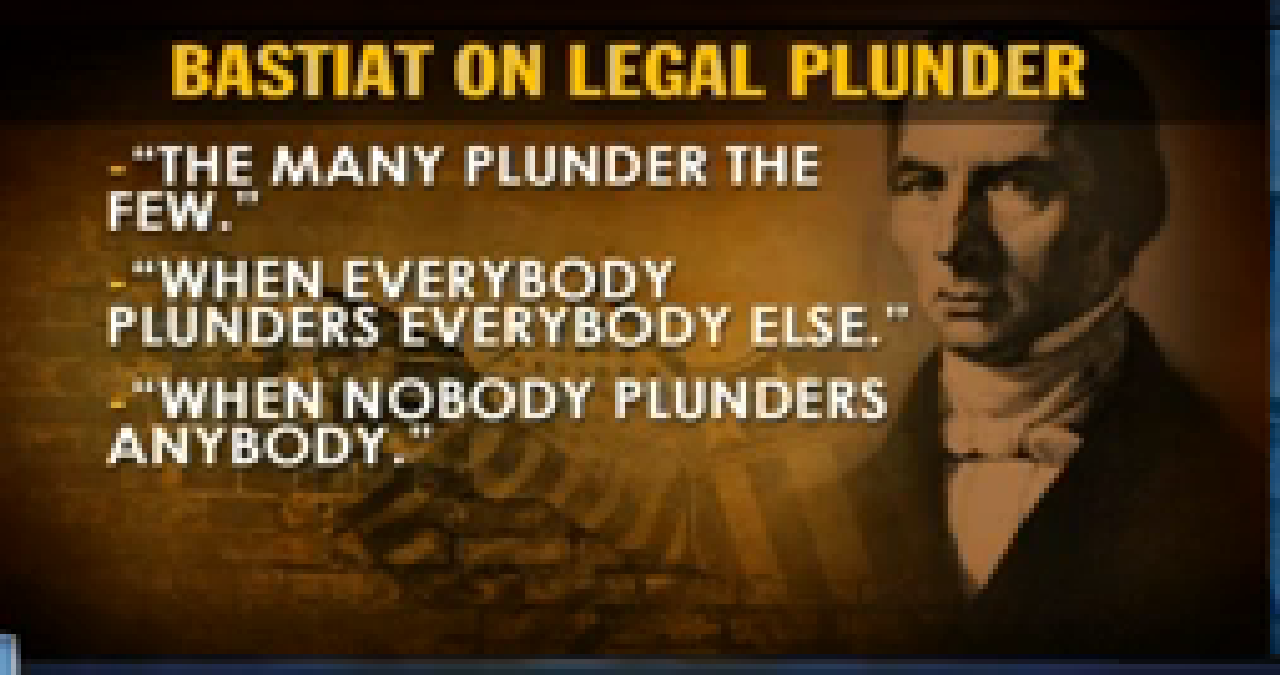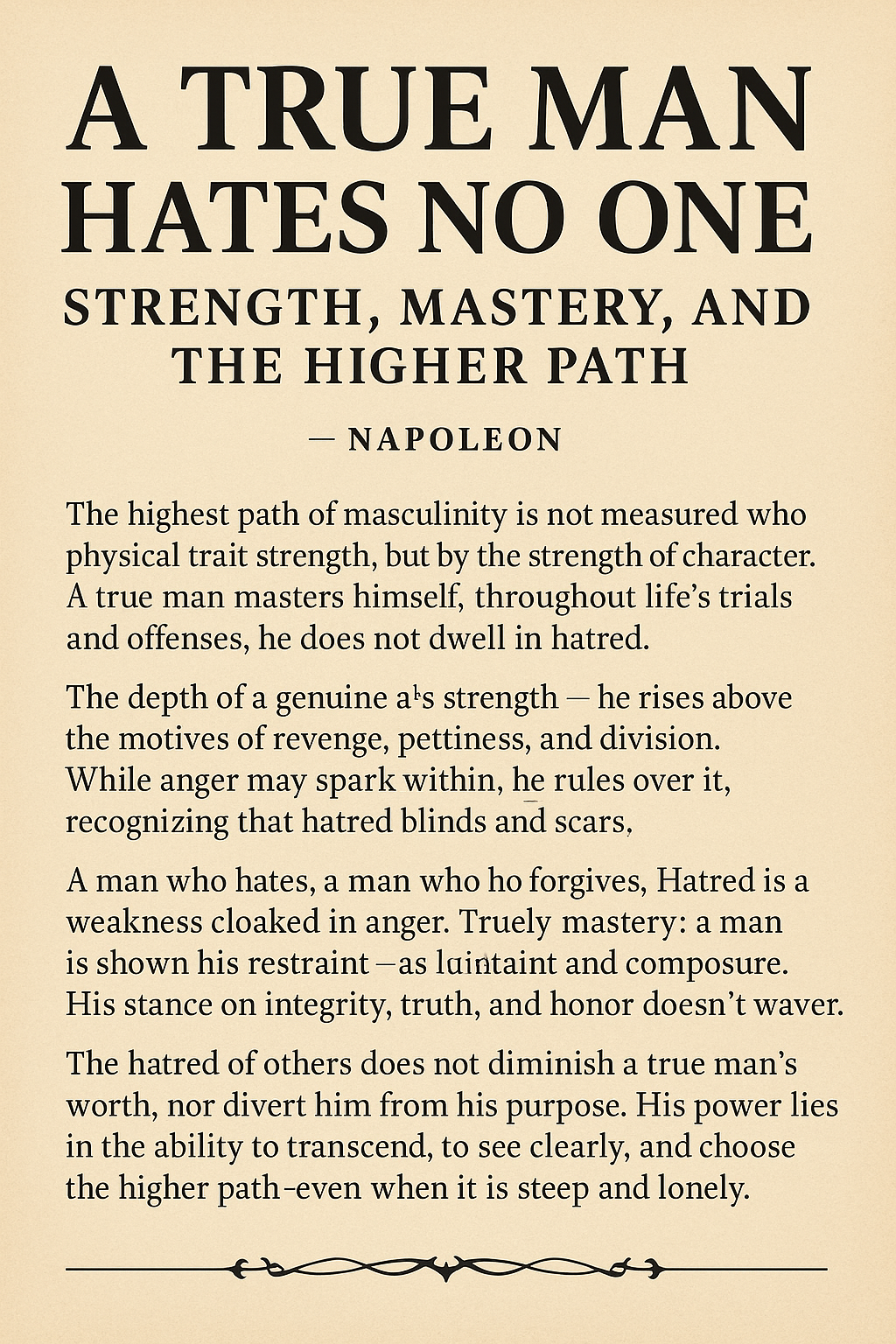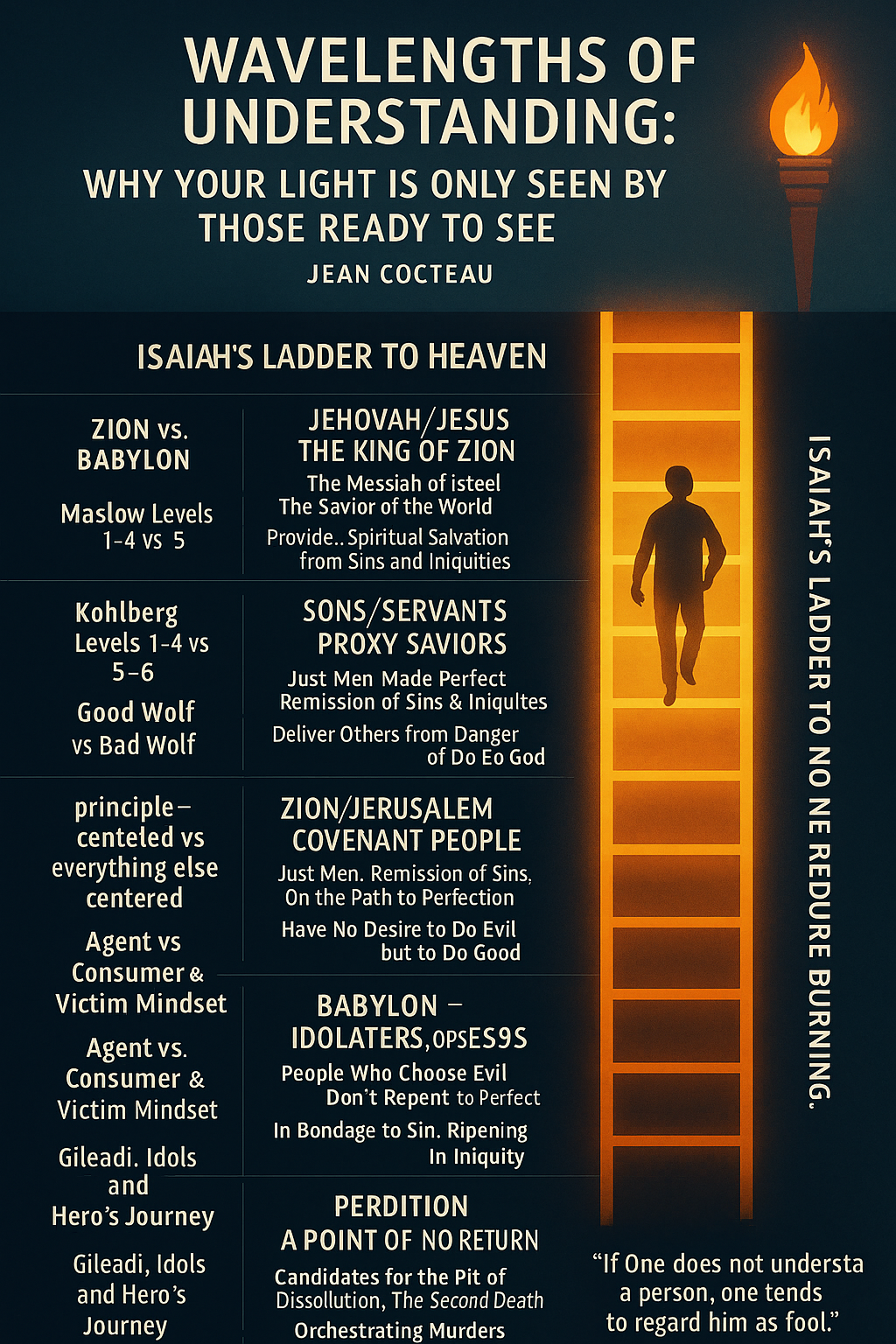“Each of us has a natural right – from God – to defend his person, his liberty, and his property. These are the three basic requirements of life, and the preservation of any one of them is completely dependent upon the preservation of the other two. For what are our faculties but the extension of our individuality? And what is property but an extension of our faculties?” — Frederic Bastiat
“The theory of the Communists may be summed up in the single sentence: Abolition of private property.” – Karl Marx
In part 1, we established the definition of property, and that government was instituted to protect the triad (life, liberty, and property). If the trio is not protected and is thus violated, justice is perverted, and our freedom deteriorates eventually into enslavement and captivity. Either we are advancing Liberty or regressing to allow harm to come to the present generation and generations to come in the form of “safety” by passing laws that violate the triad.
“Those who would give up essential Liberty, to purchase a little temporary Safety, deserve neither Liberty nor Safety.” — Benjamin Franklin
As I described in part 1, a good friend recommended that I read, The Law by Fredric Bastiat to understand property rights. It taught me about property rights, but I also learned how ignorant I was of the history, background, and intentions of the Declaration of Independence and the Constitution of the United States of America, which I had taken an Oath to Defend and Protect against foreign and domestic enemies. I was illiterate and still am a learner in these areas.
As a peace officer (now called law enforcement officers [LEO] after 9-11), at the time, I began to understand how and why certain people become domestic enemies of the U.S. Constitution because of corruption.
Corrupt: “To pervert; to falsify; to infect with errors; as, to corrupt the sacred text.”1
I started to see how words, definitions, and concepts had been changed through the years from the Founding Fathers’ original interpretation to a more watered-down version. And in some cases, a definition opposite of what was intended for a good government.
“The basic tool for the manipulation . . . is the manipulation of words. If you can control the meaning of words, you can control the people who must use the words.” — Philip K. Dick
I started to understand in order to comprehend the original intent, one would have to return to the meeting of the minds:
“Meeting of the minds (also referred to as mutual agreement, mutual assent or consensus ad idem) is a phrase in contract law used to describe the intentions of the parties forming the contract. In particular, it refers to the situation where there is a common understanding in the formation of the contract. Formation of a contract is initiated with a proposal or offer. This condition or element is considered a requirement to the formation of a contract in some jurisdictions.”
To grasp the Contract or compact, the 13 states had to create the Union and Confederacy through the Articles of Confederacy, which evolved into the US Constitution (1787). One would have to travel back in time by reading from their words and to see the “meeting of the minds” that started the Liberty movement. It was as if I would have to return to the scene where it all took place, as investigating officers did to help go over the cases they were examining. One would have to get context, background, and landscape surrounding the meeting of the minds. I also learned to comprehend the context, the thoughts, words, and concepts, I came to realize it didn’t come from one source, generation, or era. It was part of The Genealogy of the Constitution.
“On every question of construction (of the Constitution) let us carry ourselves back to the time when the Constitution was adopted, recollect the spirit of the debates, and instead of trying what meaning may be squeezed out of the text, or invented against it, conform to the probable one in which it was passed.” — Thomas Jefferson
Being a police officer, I was charged with upholding and defending the Constitution in enforcing the laws of the land. I learned how ignorant and illiterate I was in this field. The “domestic enemies” clause took on another meaning, it was those who were subverting the Founding Fathers’ intentions through time, words, the lack of education, and distractions.
“How little do my countrymen know what precious blessings they are in possession of, and which no other people on earth enjoy!” — Thomas Jefferson
America has been given many blessings.
“For unto whomsoever much is given, of him shall be much required: and to whom men have committed much, of him they will ask the more.” — Luke 12:48
At first, it was difficult to understand the definition of the law of the land. While attending the Peace Officers Standards and Training, I had the notion that every law passed by Utah and Federal legislatures . . . must be a just law merely because it is a law; “3 and every law should be enforced that was approved by Congress and legislatures.
As I gained a new perspective and insight through years of experience, observation, and maturity, I became more skeptical and literate in the triumvirate of life, liberty, and property. It dawned on me that laws are a combination of the “tendency that exists in the heart of man“3 as it controls the levers of the legislation along with the knowledge or lack of knowledge of the intentions of our Founding Fathers.
As laws pass, they either line up and affirm the trio or deteriorate over time. The laws corrupt and deteriorate because those in power: change definitions of words and phrases; and rely on distractions and the general ignorance of the dumbed-down populace to advance their rot and corruption. Thereby slowly placing us on the road to bondage. Who corrupts the laws, and what is their ultimate goal and intention?
The US and Utah constitutions are and should be considered the strict rules for how government should act through a written charter. Yet to my dismay, I learned that many laws weaken these rigorous, harsh, and disciplinary rules. These laws do not follow the U.S. or Utah Constitutions and therefore are Un-Constitutional and should not be obeyed and enforced by the police and order followers.
“Let nothing be done through selfish ambition or conceit, but in lowliness of mind let each esteem others better than himself. Let each of you look out not only for his own interests, but also for the interests of others.” –Philippians 2:3-4
Can the Law be perverted to endanger, harm, and hurt people in their life, liberty, and property by way of theft and plundering rather than protect them?
“The law perverted! And the police powers of the state perverted along with it! The law, I say, not only turned from its proper purpose but made to follow an entirely contrary purpose! The law become the weapon of every kind of greed! Instead of checking crime, the law itself guilty of the evils it is supposed to punish!” — Frederic Bastiat
We learned that the laws can be weaponized and used against the people rather than for the people by way of greed, theft, and plundering of people and a country.
“By the sweat of your face you shall eat bread, till you return to the ground, for out of it you were taken; for you are dust, and to dust you shall return” — Genesis 3:19
Man is told that we must toil and work to meet our needs. What if a man or group of men want an easier life by living off of the backs of others?
“Man can live and satisfy his wants only by ceaseless labor; by the ceaseless application of his faculties to natural resources. This process is the origin of property. But it is also true that a man may live and satisfy his wants by seizing and consuming the products of the labor of others. This process is the origin of plunder.”3
Work and labor can be intensive and quite painful.
“Now since man is naturally inclined to avoid pain—and since labor is pain in itself—it follows that men will resort to plunder whenever plunder is easier than work. History shows this quite clearly.”3
People want to avoid labor and the “sweat” on their face.
“And under these conditions, neither religion nor morality can stop it.”3
What if a group of men wanted to plunder and gain?
“This fact, combined with the fatal tendency that exists in the heart of man to satisfy his wants with the least possible effort, explains the almost universal perversion of the law. Thus it is easy to understand how law, instead of checking injustice, becomes the invincible weapon of injustice. It is easy to understand why the law is used by the legislator to destroy in varying degrees among the rest of the people, their personal independence by slavery, their liberty by oppression, and their property by plunder. This is done for the benefit of the person who makes the law, and in proportion to the power that he holds.”3
Next, we continue to learn how the law can be perverted and weaponized into protecting monopolies (read the series Monopolies are Un-American), in essence sanctioning a form of indirect slavery that, over time, could result in physical oppression.
“Thus, if there exists a law which sanctions slavery or monopoly, oppression or robbery, in any form whatever, it must not ever be mentioned. For how can it be mentioned without damaging the respect which it inspires? Still further, morality and political economy must be taught from the point of view of this law; from the supposition that it must be a just law merely because it is a law.”3
Frederic Bastiat talks about a “dominating force” and how we must entrust it “to those who make the laws.”
“But, generally, the law is made by one man or one class of men. And since law cannot operate without the sanction and support of a dominating force, this force must be entrusted to those who make the laws.”
“When the laws being passed by the legislatures are plundering, and oppressing the people instead of protecting their life, liberty and property then we have a duty to nullify and not enforce them. As a police officer, I realized the lawmakers passing the laws, were slowly destroying, fleecing, and pillaging Americans, rather than protecting and enhancing, “the Laws of Nature and of Nature’s God” contained in the Bill of Rights, the US Constitution and the Declaration of Independence. The law and the dominating force has been placed into the hands of the “unscrupulous who wish . . . to exploit the person, liberty, and property of others.”
“But, unfortunately, law by no means confines itself to its proper functions. And when it has exceeded its proper functions, it has not done so merely in some inconsequential and debatable matters. The law has gone further than this; it has acted in direct opposition to its own purpose. The law has been used to destroy its own objective: It has been applied to annihilating the justice that it was supposed to maintain; to limiting and destroying rights which its real purpose was to respect. The law has placed the collective force at the disposal of the unscrupulous who wish, without risk, to exploit the person, liberty, and property of others. It has converted plunder into a right, in order to protect plunder. And it has converted lawful defense into a crime, in order to punish lawful defense.”3
As a police officer, I was curious about why other officers and the public couldn’t see what was happening. There were several reasons I was able to come up with, but again Bastiat was able to answer this question, as people’s nature is how they believe “law is to maintain justice.” They had a hard time separating law from justice. If it is “lawful,” it is “also legitimate.” I know I did and still find the waters are murky at times.
“The nature of law is to maintain justice. This is so much the case that, in the minds of the people, law and justice are one and the same thing. There is in all of us a strong disposition to believe that anything lawful is also legitimate. This belief is so widespread that many persons have erroneously held that things are “just” because law makes them so.”
To question the validity of law being synonymous and the same with justice, we run headlong into cognitive dissonance. We feel a “state of discomfort” as “two modes of thought contradict each other.” Trying to separate law from justice brings discomfort as they clash with our beliefs and knowledge of the symbiotic, coordinated, and interdependent relationship between law and justice.
“When one learns new information that challenges a deeply held belief, for example, or acts in a way that seems to undercut a favorable self-image, that person may feel motivated to somehow resolve the negative feeling that results—to restore cognitive consonance. Though a person may not always resolve cognitive dissonance, the response to it may range from ignoring the source of it to changing one’s beliefs or behavior to eliminate the conflict.”4
Either we become aware and awake and restore “cognitive consonance” or fall back asleep, ignoring the source of pain and not changing the behavior or beliefs.
“Insanity is doing the same thing, over and over again, but expecting different results.” — Albert Einstein
If we do not fix our thoughts and place them on the right track with cognitive consonance, we will follow the rule of insanity and take a crooked, devious, and twisted path in life. Which will not only hurt you but become generational as well. We owe it to ourselves and our posterity to seek and live the truth.
We can look at both from a different perspective as we separate justice from laws. We can see them both as different. The law is a tool to obtain either justice or injustice. The law is held by men and women with good or bad intentions. We can no longer believe just because a law says so means it is just. We must evaluate by being vigilant and evaluating each law against the backdrop of life, liberty, and property.
“Thus, in order to make plunder appear just and sacred to many consciences, it is only necessary for the law to decree and sanction it. Slavery, restrictions, and monopoly find defenders not only among those who profit from them but also among those who suffer from them.”3
We must also understand that if a law is passed, they pick winners and losers. If this is happening, then it needs to be re-evaluated and stopped.
Too many times have I heard as a police officer and now as a private citizen that if someone was arrested, they automatically believe that they committed the crime without investigating it further. I have to tell these people that such is not always the case. It might be the rule rather than the exception in the present environment.
The system has been weaponized against Americans. It is called Lawfare:5
“Lawfare is the use of legal systems and institutions to damage or delegitimize an opponent, or to deter individual’s usage of their legal rights.”
“The term may refer to the use of legal systems and principles against an enemy, such as by damaging or delegitimizing them, wasting their time and money (e.g. SLAPP suits), or winning a public relations victory.”
“Alternatively, it may describe a tactic used by repressive regimes to label and discourage civil society or individuals from claiming their legal rights . . . “
“The approach of building a political narrative through false accusations and over-charging in the DOJ is the essence of Lawfare. The government has endless taxpayer resources to fuel their political weaponization of the judiciary.”
“The process of the charges then becomes the punishment by design. The targets are drained financially, sometimes physically detained under false pretense, and then the DOJ walks backwards when the judges finally ask for proof.”
Personal Knowledge of Lawfare on a County Level:
While still an officer, I had a detective once tell me about attending a training put on by the County Attorney (he is no longer in the position) for local police officers and order followers. The County Attorney told the officers present that if they felt the person had committed the crime but couldn’t prove it, he would charge the person and ruin his reputation through public relations (media). Then they would have to pay a large sum for an attorney to represent them in court. If the person were found not guilty, they would at least have the satisfaction of ruining their reputation and costing a large sum to prove their innocence. What happened to innocent until proven guilty?
I hope this practice is not being done locally or nationally, but I am skeptical. And because we are creatures of habit. This has become a common practice and institutionalized in the Justice System. It is another notch in the system to show how it has changed from the original intent to something un-American (Is Lying a Systemic Problem in the Law Enforcement Community?)
Injustice is running rampant from Federal, State, and local governments. Washington is harder for us to reach, but we can still make a difference locally.
“Men naturally rebel against the injustice of which they are victims. Thus, when plunder is organized by law for the profit of those who make the law, all the plundered classes try somehow to enter—by peaceful or revolutionary means—into the making of laws.”3
We need to elect people who understand what is going on by being enlightened and who want to “stop lawful plunder,” not those who are ignorant or want to participate in it.
“According to their degree of enlightenment, these plundered classes may propose one of two entirely different purposes when they attempt to attain political power: Either they may wish to stop lawful plunder, or they may wish to share in it.”3
As time progresses and the laws become more corrupt, we are polarized between the law and morality. It is another cognitive dissonance flashpoint we, as individuals and a society, face as the world becomes unhinged.
“No society can exist unless the laws are respected to a certain degree. The safest way to make laws respected is to make them respectable. When law and morality contradict each other, the citizen has the cruel alternative of either losing his moral sense or losing his respect for the law. These two evils are of equal consequence, and it would be difficult for a person to choose between them.”
The best example of the law and morality contradiction is presented in Captain America: Civil War.
“In the story, major disasters involving superheroes lead the US government to pass legislation requiring all heroes to register with and reveal their secret identities to the government in order to become accountable for their actions. Iron Man leads the push to support the new legislation among the superheroes, while Captain America leads a resistance effort against it. Naturally, they come to blows throughout the story, and they also debate the pros and cons of the legislation and its impact on liberty and security.”7
Iron Man chooses the law, while Captain America takes the side of morality in the form of deontology.
When and how does the Plunder stop?
“When, then, does plunder stop? It stops when it becomes more painful and more dangerous than labor. It is evident, then, that the proper purpose of law is to use the power of its collective force to stop this fatal tendency to plunder instead of to work. All the measures of the law should protect property and punish plunder.”3
IS OBSERVANCE OF WRITTEN LAWS THE HIGHEST VIRTUE OF A GOOD CITIZEN, OR IS IT SAVING OUR COUNTRY WHEN IN DANGER?
“A strict observance of the written laws is doubtless one of the highest virtues of a good citizen, but it is not the highest. The laws of necessity, of self-preservation, of saving our country when in danger, are of higher obligation. To lose our country by a scrupulous adherence to written law would be to lose the law itself, with life, liberty, property and all those who are enjoying them with us; thus absurdly sacrificing the end to the means.” — Thomas Jefferson
To save our country, we must concentrate on morality and follow like-minded individuals with the mindset, perception, and direction like Captain America, Thomas Jefferson, and Frederic Bastiat.
(1) Corrupt
(3) The Law by Frederic Bastiat
(5) Lawfare
(6) Lawfare
(7) Captain America: Civil War – conflicted heroes and a clash of philosophies








4 Responses
Nothing like a Utah theoconstitutionalist penning a Bundy piece anonymously from the home of The Freemen.
What do have against Bundy? Or a Constitutionalist? Or even a theoconstitutionalist if he does nothing wrong? Or somebody from Utah? Are you prejudice Chris?
Besides, the piece wasn’t even about Bundy.
Great story